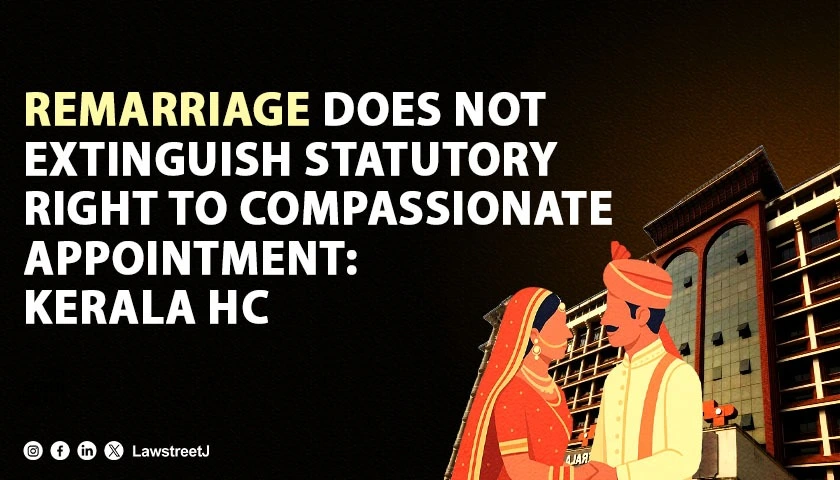Kerala: The Kerala High Court has held that the remarriage of a dependent does not extinguish the statutory right to compassionate appointment under Rule 51B of Chapter XIVA of the Kerala Education Rules, and directed that the petitioner be appointed to the existing or next arising vacancy in the aided school where her deceased husband had served.
Justice N. Nagaresh delivered the judgment while allowing the writ petition filed by Mini R.K., whose claim for compassionate appointment had been rejected by the school manager on the ground that she had remarried after her husband’s death.
The petitioner’s husband, Mohanasundaram K.P., who was working as a High School Assistant (Social Studies) at Karimbil High School, died in harness on 17 August 2017. The petitioner applied for compassionate appointment on 18 December 2017, and the school management acknowledged her claim, stating that no suitable vacancy was available at the time. The petitioner, who had passed SSLC and had no children, was dependent on her late husband and faced significant personal and financial hardship after his death. As her aged mother required support and she lacked family assistance, she remarried in September 2018. Her remarriage resulted in the discontinuation of her family pension.
A vacancy for the post of Office Attendant arose in the school on 31 March 2024. The petitioner renewed her request for appointment, but the Manager issued an order on 4 January 2025 (Ext. P6) stating that her remarriage rendered her ineligible under the Government Orders governing compassionate appointments, and further alleged that she had not submitted her application in the prescribed form nor produced a dependency certificate at the time of her husband’s death.
Rejecting these reasons, the Court noted that the petitioner had indeed applied in the prescribed form in 2017, and that the Supreme Court’s judgment in Shreejith v. Deputy Director (Education) made it clear that an application cannot be rejected merely for not being in the prescribed format. The Court further held that the petitioner had been a dependent of the deceased at the relevant time, thereby meeting the essential condition under Rule 51B.
The Court also observed that while compassionate appointment to dependents of government servants is governed by executive instructions that may disqualify a widow or widower upon remarriage, the situation of aided-school employees stands on a different footing.
It held that, for staff of aided schools, compassionate appointment flows not from executive directions but from a statutory mandate. Rule 51B expressly provides that the Manager “shall give employment to a dependent of an aided school teacher dying in harness,” thereby conferring a vested statutory right. Government Orders apply only mutatis mutandis and cannot be interpreted in a manner that defeats this statutory right.
The Court emphasised that compassionate appointment was earlier denied to the petitioner not due to her ineligibility but due to non-availability of a vacancy, and her subsequent remarriage cannot extinguish the statutory entitlement already vested in her.
Finding the rejection unsustainable, and noting the unjust consequences of denying employment to a widow who had waited in good faith for a vacancy to arise, the Court set aside Ext. P6 and directed that the petitioner be appointed to the existing or next arising vacancy in the school.
Appearance:
The petitioner was represented by Sri C.P. Peethambaran, Smt. Karthika Peethambaran, Smt. Neeraja Venugopal, Sri Arjun J. Das, and Smt. Divya Varghese, Advocates.
Respondents were represented by Sri Murali Pallath, Advocate, and Smt. Anima M., Government Pleader.
Case Title: Mini R.K. v. State of Kerala & Ors.




![Kerala HC Quashes 498A Dowry Harassment Case Against Live-In Partner, Citing Lack of Relative Status [Read Order]](/secure/uploads/2023/08/lj_5693_1057c042-1e57-4e27-8c9e-25af0ec38ec4.jpg)
![Watching porn on mobile: Kerala HC highlights importance of mother cooked meals, outdoor sports [Read Order]](/secure/uploads/2023/09/lj_9155_Parental_supervision_of_mobile_phone_usage.jpg)
![Lakshadweep MP Mohammed Faizal Disqualified from Lok Sabha After Conviction Suspension Plea Rejected by Kerala High Court [Read Notice]](/secure/uploads/2023/10/lj_9640_87b5fd97-0e05-4ff8-9a99-3be1e4446192.jpg)





